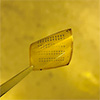| Dec 02, 2024 |
|
(Nanowerk News) A DGIST research team led by Professor Kwon Hyuk-joon of the Department of Electrical Engineering and Computer Science (first author Dr. Jang Bong-ho) has developed a technology to manufacture high-performance liquid process-based electronic parts at lower temperatures than what was previously possible by harnessing the “heat of combustion” generated in materials.
|
|
As the technology does not require high temperatures, it can be applied to plastic substrates that are vulnerable to heat, so it is expected to be widely used in electronic devices that can be bent or folded and smart devices that can be worn on the body.
|
|
The findings are published in npj Flexible Electronics (“Combustion-assisted low-tempreture ZrO2/SnO2 films for high-performance flexible thin film transistors”).
|
 |
| Thin film transistors on flexible plastic substrates developed by the research team. (Image: DGIST)
|
|
Recently, easy-to-bend or thin electronic devices have become a part of our daily lives. Electronic devices such as smartwatches, bendable screens, and wearable sensors offer enhanced convenience and versatility and are expected to be applied across various fields in the future. To develop these products, flexible yet robust electronic components are essential.
|
|
Thin-film transistors, which are essential for fabricating flexible electronics, must be made extremely thin and precise. In particular, liquid-phase processes, which apply coating materials in a liquid state, are suitable for low-cost mass production.
|
|
However, they have been limited by the high temperatures required to produce high-quality thin films, making them difficult to apply to flexible substrates such as heat-sensitive plastics. Consequently, researchers have focused on developing new fabrication methods that can lower the temperature while maintaining high performance.
|
|
To overcome these limitations, Prof. Kwon’s team used a “combustion synthesis” method. Just as a heat pack generates its own heat to warm up, this method harnesses the heat generated inside the material during the liquid process to produce high-performance oxide films without increasing the external temperature. The research team employed this method to produce a high-performance thin-film transistor on a plastic substrate at temperatures as low as 250 degrees Celsius.
|
|
The transistor they developed outperforms existing products in terms of flexibility and durability. It has excellent electrical performance even on thin and bendable plastic substrates, and it has demonstrated stable operation in bending tests of over 5,000 cycles. In other words, it is suitable for next-generation flexible electronics and wearable devices.
|
|
“Conventional liquid-phase materials have great advantages in terms of their high connectivity with printing technology. However, they also have limitations, such as the high temperatures required to form excellent thin films. For this reason, it is difficult to apply them to flexible substrates with low thermal resistance,” said Prof. Kwon of the Department of Electrical Engineering and Computer Science. “The results of this study pave the way for expanded applications across various fields by dramatically reducing the process temperature of high-performance liquid-phase materials.”
|


